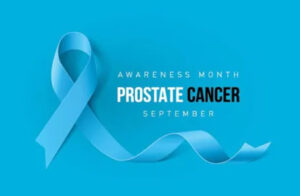
As September comes to an end, shedding light on the second most common cancer among men worldwide brings awareness, support and understanding.
Prostate Cancer Awareness Month reminds men to educate themselves, to recognize the risks and make proactive efforts to protect their health. This month’s primary purpose is to increase awareness about how common prostate cancer is and the need for early identification.
According to the American Cancer Society, prostate cancer begins when cells in the prostate gland start to grow out of control.
The prostate is important for male reproductive health because it produces seminal fluid supporting and carrying sperm. While the prostate is an essential element of the male reproductive system, it may also cause health problems, especially as men age.
No matter how old or young a man may be, he can have prostate cancer. The cancer is the size of a walnut, but it can become much more prominent as a man ages.
In the United States, it is estimated that there are over 248,000 new cases and about 34,700 deaths from prostate cancer every year, according to the American Cancer Society.
It is recommended that early detection and seeking professional help are the best ways to know and get rid of this cancer.
With this knowledge, it is safe to say that men need to know what is happening in their bodies regardless of age because knowing is very important.
There is no telling what the leading cause of prostate cancer is, but there are a few ways men can check on their status. The odds of developing prostate cancer can rise quickly after the age of 50.
Another way a man can determine if he may or may not have prostate cancer is his race or ethnicity. Prostate cancer affects African American men and Caribbean men of African descent more often, according to the American Cancer Society.
There are many other ways to see if prostate cancer may affect a man’s life, but there is no natural way of knowing without getting a routine screening, such as PSA blood tests and digital rectal exams. These are critical for detecting the disease early in its more curable stages.
With September being prostate cancer awareness month, this can also reduce the stigma associated with this disease. For many men, discussing their health can be uncomfortable or embarrassing. However, open communication and support from family, friends, support groups and healthcare practitioners may make a significant difference in recovery.
With September coming to an end, let us remember that not only does this month offer knowledge about the prostate, but it also identifies ways people can help individuals who may need support mentally, financially and physically.